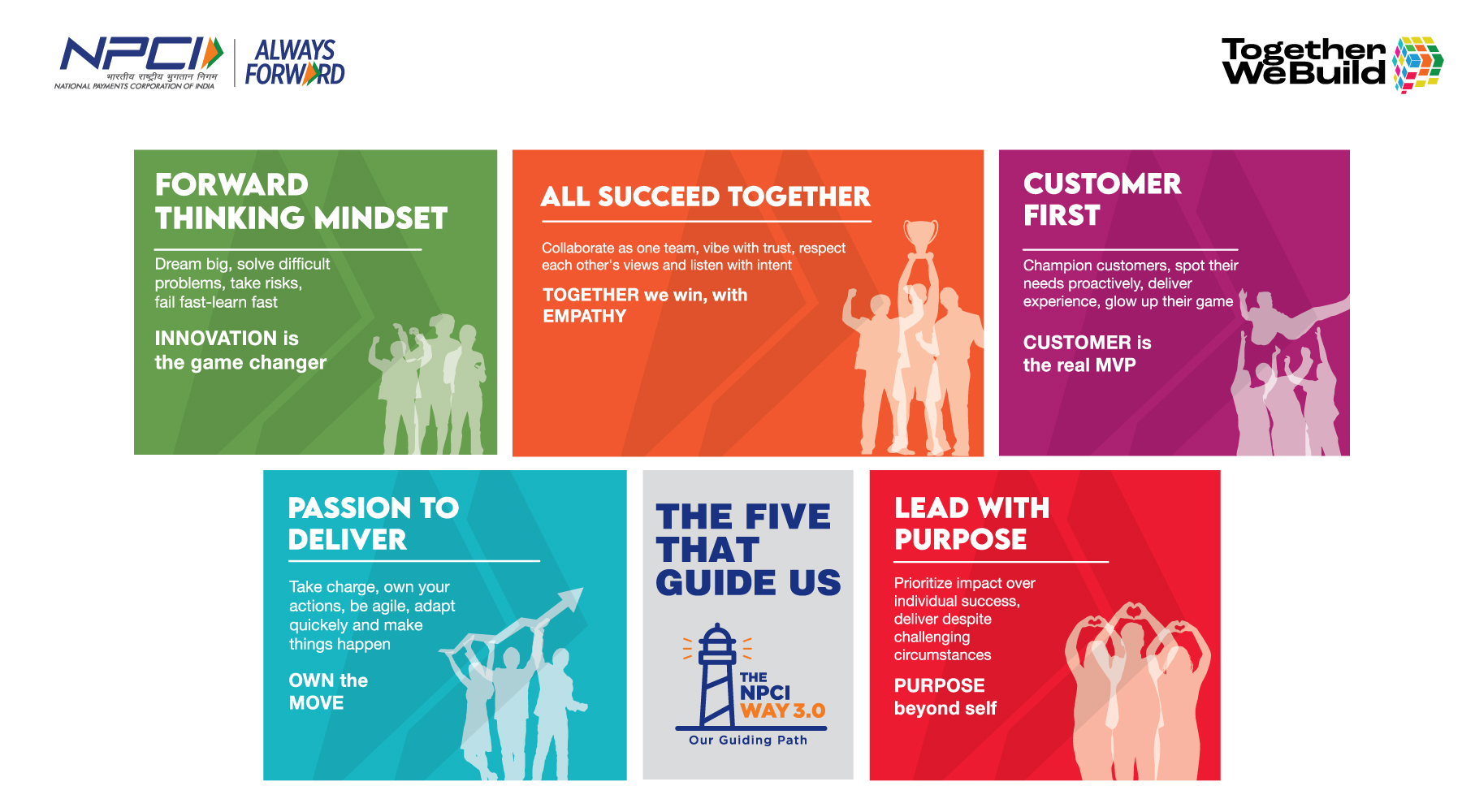
National Payments Corporation of India (NPCI), an umbrella organisation for operating retail payments and settlement systems in India, is an initiative of the Reserve Bank of India (RBI) and the Indian Banks' Association (IBA) under the provisions of the Payment and Settlement Systems Act, 2007, for creating a robust Payment & Settlement Infrastructure in India.
Considering the utility nature of the objects of NPCI, it has been incorporated as a "Not for Profit" Company under the provisions of Section 25 of the Companies Act 1956 (now Section 8 of the Companies Act 2013), with an intention to provide infrastructure to the entire Banking system in India for physical as well as electronic payment and settlement systems. The company is focused on bringing innovations to retail payment systems through the use of technology to achieve greater efficiency in operations and widen the reach of payment systems.
The ten core promoter banks are State Bank of India, Punjab National Bank, Canara Bank, Bank of Baroda, Union Bank of India, Bank of India, ICICI Bank Limited, HDFC Bank Limited, Citibank N. A. and HSBC. In 2016, the shareholding was broad-based to 56 member banks, including more banks representing all sectors. In 2020, new entities regulated by RBI were introduced, consisting of payment service operators, payment banks, small finance banks, etc. The shares were allotted pursuant to the issuance of equity shares on a private placement basis in compliance with the applicable provisions of the Companies Act 2013.
NPCI, during its journey, has made a significant impact on the retail payment systems in the country. Dedicated to the nation by our former President, Shri Pranab Mukherjee, endorsed by the Hon'ble Prime Minister, Shri Narendra Modi and later made the card of choice for the ambitious Pradhan Mantri Jan Dhan Yojana, RuPay is now a known name.
RuPay is an Indigenously developed Payment System – designed to meet the expectation and needs of the Indian consumer, banks and merchant eco-system. RuPay supports the issuance of debit, credit and prepaid cards by banks in India and thereby supporting the growth of retail electronic payments in India.
RuPay is well poised to explore innovative payment opportunities such as Contactless – offline and online to drive the adoption of low-value payments. All RuPay Cards will now have the functionality of NCMC which can enable low-value contactless payments (like transit, toll, parking, and retail) using Offline technology.
The alliances with international network partners (Discover Financial Services, Japan Credit Bureau and China Union Pay) provide valuable access to a global acceptance footprint and offer world-class payment solutions to RuPay cardholders.
With Immediate Payment Service (IMPS), India has become the leading country in the world in real-time payments in the retail sector.
National Automated Clearing House (NACH) is an offline web-based system for bulk push and pull transactions. NACH provides an electronic mandate platform to register mandates, facilitating a paperless collection process for corporates and banks. It provides for both account-based and Aadhaar-based transactions.
The Aadhaar Payment Bridge (APB) System is helping the government and government agencies make direct benefit transfers for various central and state-sponsored schemes.
To access these funds at the doorstep & drive financial inclusion in India, an Aadhaar-enabled Payment System (AePS) has been introduced. Since its inception it has become instrumental to increase accessibility of basic banking services in underserved areas. To extend the convenience of biometrics to merchant payments, BHIM Aadhaar has been launched by Hon'ble Prime Minister Narendra Modi.
National Financial Switch (NFS) is the largest network of shared Automated Teller Machines (ATMs) in India, facilitating interoperable cash withdrawal, card-to-card funds transfer and interoperable cash deposit transactions, among other value-added services in the country.
Unified Payments Interface (UPI) has been termed as the revolutionary product in the payment system.
Bharat Bill Payment System is offering a one-stop bill payment solution for all recurring payments with 200+ Billers in the categories Viz. Electricity, gas, water, telecom, DTH, loan repayments, insurance, FASTag recharge, cable, etc., are available across India.
National Payments Corporation of India (NPCI) has developed the National Electronic Toll Collection (NETC) program to meet the electronic tolling requirements of the Indian market.
It provides an electronic payment facility for customers to make payments at national, state and city toll plazas by identifying the vehicle uniquely through a FASTag. FASTags are Radio-Frequency Identification (RFID) stickers that are affixed to the vehicle windshield and enable the driver to make toll payments electronically while the vehicle is in motion without stopping at the Toll plazas by saving fuel and time.
With these products, the aim is to transform India into a 'less-cash' society by touching every Indian with one or more payment services. With each passing year, we are moving toward our vision of being the best payments network globally.
DPSS, at its meeting held on September 24, 2009, had given in-principle approval to issue an authorization to NPCI for operating various retail payment systems in the country and granted a Certificate of Authorization for the operation of National Financial Switch (NFS) ATM Network with effect from October 15, 2009. NPCI had deputed its officials to IDRBT Hyderabad and had taken over NFS operations on December 14, 2009. Membership regulations and rules were framed to enrol all banks in the country as members. This was done so that when the nationwide payment systems were launched, all would get included on a standardized platform.
A Technical Advisory Committee was constituted with two eminent professors of IIT, Mumbai. Prof. N.L. Sarda is the Chairman, and Prof. G. Sivakumar is the Co-Chairman of the Technical Advisory Committee. Members of these committees are from banks at the level of Deputy General Manager and Asst. General Manager.


Dream big, solve difficult problems. Take risks, fail fast-learn fast
We’re always looking forward—curious, bold, and ready to take calculated risks. It’s about experimenting, trying new ideas, and learning quickly when things don’t go as planned, embracing real perseverance. We aim to solve complex challenges with creativity and courage. Every step we take today towards a bold dream, shapes a smarter tomorrow. Even if we stumble, we get back up, refine our approach, and keep moving. The goal is to stay open to change, embrace the unknown, and never stop improving. Progress starts with a mindset that’s hungry to explore what’s next.
Champion customers, spot their needs proactively, deliver experience, glow up their game
The people we serve are at the heart of everything we do. Understanding what they need—even before they ask—is key to making their experience better. It’s not just about meeting expectations but going the extra mile to make a real difference in their journey. Every interaction is a chance to build trust and create value. When we focus on helping them grow, we grow too. Staying tuned in to their world helps us build better products, smarter solutions, and stronger relationships that last.
Prioritize impact over individual success; deliver despite challenging circumstances
Our core ethos revolves around the central theme of contributing to nation and society at large, catalysing the transformative growth journey. We have our unwavering focus on impact over profits and fostering a deep sense of pride in being a part of this nation-building endeavour. It’s about putting the bigger picture above personal gain. It means making choices that matter—not just for today, but for the long haul. Even when the path is unclear or difficult, we stay focused on the impact we want to create. We lift others, stay grounded in what’s important, and follow through no matter what. Purpose gives our work meaning and helps us build something that truly counts.
Take charge, own your actions, be agile and adapt quickly. Make things happen
For us, bias for action is fundamental. Recognizing the balance between swift action and efficient execution are pivotal to delivery. Getting things done is about showing energy, taking responsibility, and pushing through challenges with determination. When change happens, we stay flexible and adjust fast. It’s not always easy, but we take pride in seeing things through from start to finish. We care deeply about the outcome and give it our all, every time by making prompt and informed decisions. This tenet also defines our commitment to achieving results and effectively, driving our organization forward in a dynamic and competitive landscape.
Collaborate with peers, teams, customers, and ecosystem partners, vibe on trust, respect and real talk. Stay open to diverse perspectives and listen actively
We believe great things happen when people connect, support one another, and work with mutual understanding. It’s about building strong relationships—with teammates, customers, and partners—by being honest, respectful, and open-minded. Everyone’s voice matters and listening with care helps us learn and grow. We’re stronger when we lift each other up and move forward as a unit. By being kind, curious, and real with each other, we create a space where everyone has a chance to do their best and feel valued. Success is sweeter when it’s shared.